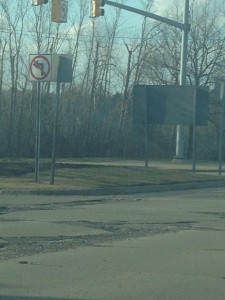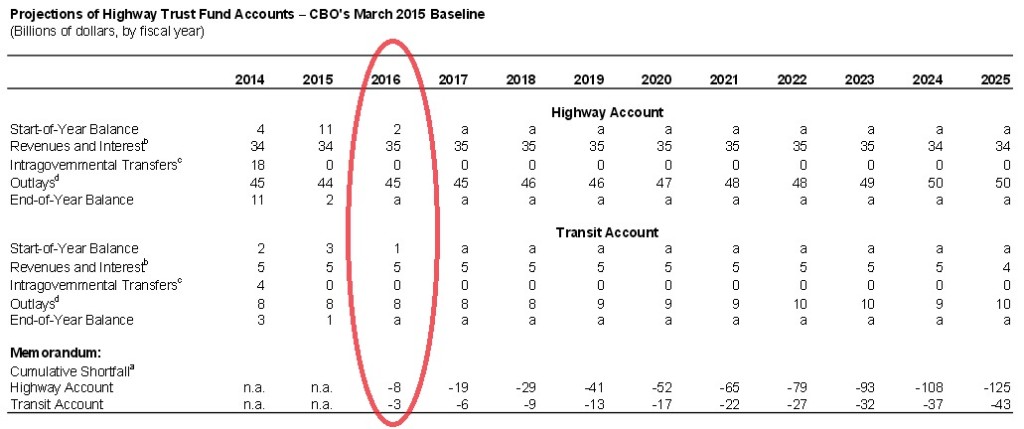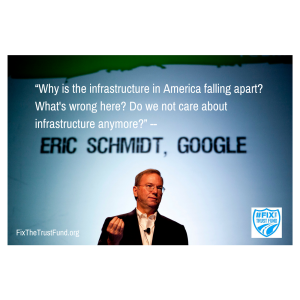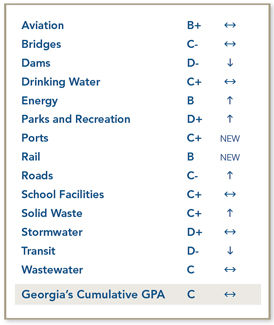Senate Committee Passes Surface Transportation Bill
June 24th, 2015 | By: America's Infrastructure Report Card
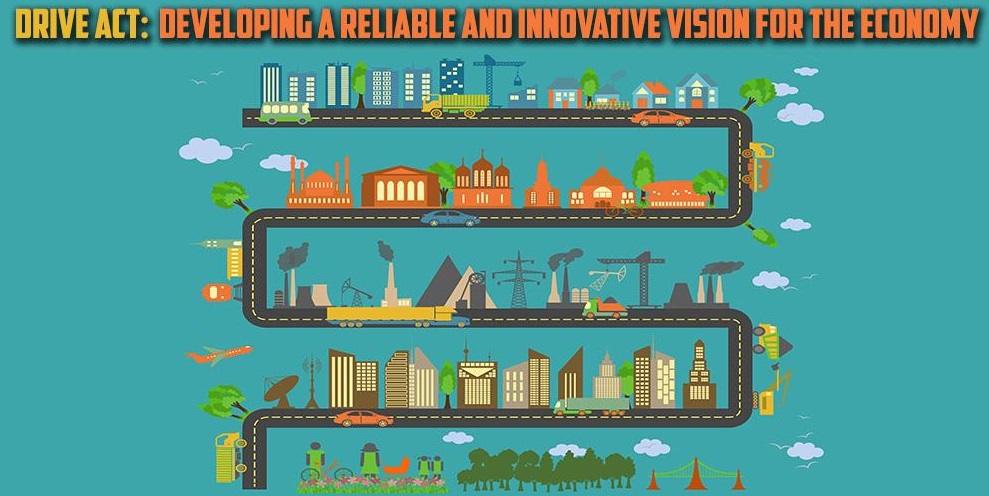 Today, the U.S. Senate Environment and Public Works Committee (EPW) unanimously approved a six-year, $278 billion federal highway portion of the surface transportation authorization bill, the Developing a Reliable and Innovative Vision for the Economy (DRIVE) Act. The DRIVE Act was unveiled earlier this week by EPW Committee leaders Chairman James Inhofe (R-OK), Ranking Member Barbara Boxer (D-CA), Subcommittee Chairman David Vitter (R-LA) and committee member Senator Thomas Carper (D-DE).
The bill would increase funding levels for highway programs by approximately $2.5 billion per year. The responsibility to identify how to pay for that increase, along with the annual Highway Trust Fund shortfall of $15 billion, belongs to the Senate Finance Committee. Tomorrow the Finance Committee will hold a hearing on transportation financing, where in testimony to the Committee ASCE underscored the importance of public support for funding as necessary to improving future financing opportunities. While Finance is still determining how they would like to pay for the DRIVE Act, in a recent interview with ASCE, Chairman Inhofe noted that he believes that General Fund revenues plus dollars from any corporate repatriation tax changes could address the funding gap. In addition to Finance, there are a few other Senate committees that need to act before the July 31 deadline to approve their transportation policy pieces, like transit and driver safety items.
ASCE sent a support letter to Senate leaders in favor of the DRIVE Act and President Bob Stevens issued a statement where he said, “The DRIVE Act achieves many of the goals that we as civil engineers believe must be addressed in the next surface transportation reauthorization and accomplishes these goals in a bipartisan fashion.” Some of the policy items contained in the DRIVE Act that ASCE supports include:
Today, the U.S. Senate Environment and Public Works Committee (EPW) unanimously approved a six-year, $278 billion federal highway portion of the surface transportation authorization bill, the Developing a Reliable and Innovative Vision for the Economy (DRIVE) Act. The DRIVE Act was unveiled earlier this week by EPW Committee leaders Chairman James Inhofe (R-OK), Ranking Member Barbara Boxer (D-CA), Subcommittee Chairman David Vitter (R-LA) and committee member Senator Thomas Carper (D-DE).
The bill would increase funding levels for highway programs by approximately $2.5 billion per year. The responsibility to identify how to pay for that increase, along with the annual Highway Trust Fund shortfall of $15 billion, belongs to the Senate Finance Committee. Tomorrow the Finance Committee will hold a hearing on transportation financing, where in testimony to the Committee ASCE underscored the importance of public support for funding as necessary to improving future financing opportunities. While Finance is still determining how they would like to pay for the DRIVE Act, in a recent interview with ASCE, Chairman Inhofe noted that he believes that General Fund revenues plus dollars from any corporate repatriation tax changes could address the funding gap. In addition to Finance, there are a few other Senate committees that need to act before the July 31 deadline to approve their transportation policy pieces, like transit and driver safety items.
ASCE sent a support letter to Senate leaders in favor of the DRIVE Act and President Bob Stevens issued a statement where he said, “The DRIVE Act achieves many of the goals that we as civil engineers believe must be addressed in the next surface transportation reauthorization and accomplishes these goals in a bipartisan fashion.” Some of the policy items contained in the DRIVE Act that ASCE supports include:
- Increased program funding over a six-year period;
- Multi-year program certainty that will help states and localities better plan and deliver projects;
- Prioritizing funding for bridge maintenance and repair;
- A focus on Interstate Highway System maintenance;
- Establishment of a new freight program, funded at $2 billion annually, to improve goods movement;
- Establishment of a new competitive grant program for large highway projects;
- Increased accounting and reader-friendly reporting of how Highway Trust Fund dollars are spent;
- Accelerated project delivery reforms aimed to improve collaboration between agencies and create deadlines for agency action(s);
- An option for rural areas to bundle small projects such as bridges to increase efficiency;
- Encouragement of agencies on resilience planning and natural disaster risk reduction;
- Expanding tolling to be available for use on all new Interstate Highway System lane construction projects;
- Creating a new intelligent transportation systems grant to accelerate technology deployment; and
- Providing grants to states for continued and expanded pilot testing of future road user fee collection systems.
#FixTheTrustFund This Week: Keeping the U.S. from Driving into Potholes
June 22nd, 2015 | By: America's Infrastructure Report Card
The Highway Trust Fund (HTF) was set up in 1956 to fund the build and maintain a transportation network nationwide. Today, it is the national bank account for roads, bridges and transit that reimburses states for eligible projects. Inaction by Congress has put the Highway Trust Fund in jeopardy, and with a month left before the temporary funding fix runs out on July 31st, Congress is nowhere near to closing a deal to generate sustainable revenue for the nation’s highway, bridge, and transit systems – investments vital to the health of our recovering economy. #FixTheTrustFund is a call to action to solve this transportation problem today. This week Congress is slated to step up hearings on transportation. Here’s what we’ll be watching in national campaign to #FixTheTrustFund this week: June 23, 10 a.m.: Senate Transportation, Housing and Urban Development, and Related Agencies Appropriations Subcommittee markup of a fiscal 2016 transportation spending measure. (Listen live) June 24, 9:30 a.m.: Senate Environment and Public Works Committee to mark up the Developing a Reliable and Innovative Vision for the Economy, or DRIVE, Act. (Info) What to watch for: With the current strong bipartisan consensus, we expect the mark-up to go smoothly. That action will put pressure on the other authorizing committees and the Senate Finance Committee to secure their pieces of the bill before the July 31 legislative deadline. The Senate the Finance Committee will hold a hearing on private sector investment and public-private partnerships with the former Indiana governor Mitch Daniels and current Colorado DOT chief Shailen Bhatt. Ranking Member Ron Wyden (D-OR) is expected to highlight his new bipartisan bill that would expand tax-exempt private activity bonds and create a new federal infrastructure tax credit. June 24, 2 p.m.: House Ways and Means Subcommittee on Select Revenue Measures hearing on the “taxation of the repatriation of foreign earnings as a funding mechanism for a multiyear highway bill.” (Info) What to watch: Across the Capitol in the U.S. House of Representatives, the Ways and Means Subcommittee on Select Revenue Measures will hold a hearing on the prospect of taxing U.S. corporate foreign earnings – otherwise known as repatriation – for deposit in the HTF, which the Obama Administration supports. This funding fix does not have unanimous support on either the Republican or Democratic side of the aisle, so expect some internal party disagreements on this as a solution along with some opposition from large, multinational corporations who will be on the hook to pay the tax. June 24, 2 p.m.: House Transportation and Infrastructure Highways and Transit Subcommittee hearing on “Meeting the Transportation Needs of Rural America.” (Watch live) June 25, 10 a.m.: Senate Finance Committee hearing on exploring ways that private financing could back infrastructure projects. (Info) Help Us #FixTheTrustFund 1. Tell Congress that it’s time to fix the Highway Trust Fund and increase our investment into transportation before the July deadline. 2. If you’re in MD, OR, CO, TX or WI, attend a Town Hall Meeting this week and ask your Member of Congress about their ideas on how to fix the Highway Trust Fund.| 6/24/2015 | Rep. Harris (R-MD-1) | This meeting is conducted by telephone.For more information on this meeting, follow this link: vekeo.com/event/congressman-andy-harris-06242015/?awesm=vekeo.buzz_t1u/ | Starts at 6:45 pm |
| 6/27/2015 | Sen. Wyden (D-OR) | Hood River Valley Adult Center2010 Sterling Dr.Hood River, OR 97031 | Starts at 1:00 pm |
| 6/27/2015 | Rep. Perlmutter (D-CO-7) | Natural Grocers by Vitamin Cottage4900 Kipling St.Wheat Ridge, CO 80033 | Starts at 10:00 am |
| 6/27/2015 | Rep. Sessions (R-TX-32) | Richland CollegeGarland Campus675 West Walnut StreetGarland, TX 75040-5023This meeting requires an RSVP. Register online.For more information on this meeting, follow this link: sessions.house.gov/index.cfm/june-town-hall | Starts at 11:00 am |
| 06/28/2015 | Rep. Sensenbrenner (R-WI-5th ) | Brookfield Public Safety Building 2100 North Calhoun Road Brookfield, WI 53005For more information on this meeting, follow this link: sensenbrenner.house.gov/contact/ | Starts at 7:00 pm |
Michigan Must Say Yes to Safer Roads
April 8th, 2015 | By: Becky Moylan
In Michigan, a common saying is “there are two seasons: winter and road construction.” Rough winters and underinvestment for the past 50 years have led the Great Lakes state to have some of the worst roads in the nation. And while construction season may seem constant during the warmer months, the truth is currently the state cannot keep up with meeting the needs to maintain or improve roads and bridges. The continual underinvestment has led to a backlog of needs and safety issues. Gov. Rick Snyder has been advocating for the past few years that something needs to be done to change the state’s trajectory. Last December, in an eleventh hour deal, the state legislature decided to punt the decision to the voters. In just under a month, the option to increase funding for roads will be considered at the polls. If passed, Proposal 1 would raise $1.2 billion a year to be invested exclusively into transportation. As I drove around my hometown last week, this seemed like a no-brainer. I’ve included a couple photos, but it does not fully do the problem justice. Many roads are in such bad shape that debris lines the shoulders of the street, rubble that is a byproduct of the potholes and gaping cracks in the pavement. The same month state lawmakers devised Prop 1, TRIP released a study revealing poor roads were costing the average Michigan driver $539 a year —and remember it’s the Motor City, people love their cars and many work for the auto industry. In some areas the extra vehicle operation costs that include accelerated vehicle depreciation, additional repairs, increased fuel consumption and tire wear costs drivers as much as $851 a year. Here is how Proposal 1 works:- Raise the state sales tax rate by one penny, from 6 percent to 7 percent
- Implement a series of laws that exempt fuel from the sales tax, then impose a higher fuel tax whose revenue would be used exclusively for transportation
- Raise vehicle registration fees to increase transportation funding
- Raises $1.2 billion each year to increase investment in transportation—bringing Michigan more in line with the transportation investment of neighboring states
- Ensure every penny raised at the gas pump goes to improving Michigan’s roads, bridges and public transit
- Protect taxpayers by getting road builders to give warranties on the roads they build
Tags: bridges, Michigan, roads, surface transportation, transit
2 Comments »
Action to Fix Highway Trust Fund Needed by This Summer
March 9th, 2015 | By: America's Infrastructure Report Card
Tags: bridges, highway trust fund, infrastructure, roads, transit, transportation
No Comments »
Chime in on Wednesday to Fix the Trust Fund
February 9th, 2015 | By: Becky Moylan
As Congress continues the debate on the best way to #FixTheTrustFund and modernize America’s roads, bridges, and transit, USDOT Sec. Foxx and Transportation & Infrastructure Chairman Bill Shuster are heading to Twitter for a bipartisan “townhall” to discuss surface transportation. The town hall, a first of its kind, will be Wednesday, Feb. 11 after Sec. Foxx concludes his testimony in from of the U.S. House of Representatives’ Transportation & Infrastructure Committee, around 12 p.m. ET.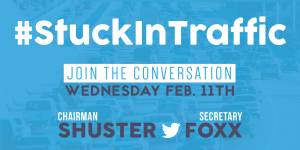 Now it’s up to you to ask your questions about transportation investment and voice your support for a long-term funding solution. To get the conversation rolling, here are some key facts from the 2013 Report Card for America’s Infrastructure that would make great tweeting material. To join in the conversation, use #StuckInTraffic anytime between now and Wednesday.
Now it’s up to you to ask your questions about transportation investment and voice your support for a long-term funding solution. To get the conversation rolling, here are some key facts from the 2013 Report Card for America’s Infrastructure that would make great tweeting material. To join in the conversation, use #StuckInTraffic anytime between now and Wednesday.
- One in nine U.S. bridges is structurally deficient.
- 45% of Americans don’t have access to public transportation.
- 42% of major urban highways are congested, costing the economy $101B a year.
- 32% of America’s major roads are in poor or mediocre condition.
- Americans spend nearly a week’s worth of vacation time—34 hours—stuck in traffic each year.
- If we don’t improve our transportation infrastructure, each family’s budget will lose $1060 a year by 2020.
- If we don’t improve our transportation infrastructure, America will lose 877,000 jobs by 2020.
Tags: bridges, congress, highway trust fund, roads, surface transportation, transit
No Comments »
This Week in Infrastructure: Federal Funding Proposals Outline Roadmap for the Future
February 6th, 2015 | By: Olivia Wolfertz
Between the USDOT’s 30-year transportation funding plan, Obama’s 2016 budget featuring the GROW AMERICA act and testimonies of transit needs in the media, our nation’s beleaguered infrastructure is getting some much-needed attention. One blaring example of the our nation’s urban transit needs is evident in James Robertson’s now viral story of walking 21 miles as part of his commute to and from work in Metro Detroit due to lack of transit. While this is an extreme case, Metro Detroit’s transit options have become fewer over the last five years. The Detroit Free Press reported that tens of thousands of Detroit residents have limited or zero access to public transit that meets their core needs, echoing the Report Card’s assessment that 45 percent of households don’t have access to transit. According to the Detroit Free Press, the cascading effect of transit needs is critical as, “cities live and die on their ability to move their citizens around.” In May, Director of Michigan DOT, Kirk Steudle, has the opportunity to begin addressing this need along with the state of the roads by passing Proposition 1 which will remove the sales tax from gas and allow the fuel tax to be raised, in order to provide for transit needs and “stop the decline” of Michigan’s roads. Infrastructure is a problem across the nation. America’s roads are now ranked no. 16 in the world, behind countries such as Oman, the United Arab Emirates and Portugal. The USDOT’s 30 Year Transportation Plan Blue Paper compares our nation’s infrastructure quality, broken down by sector, with that of the world’s. It also projects how failing to invest in our infrastructure, as the country’s population continues to increase, will affect the daily lives of every American. It is startling to think that by 2045 traffic conditions like that in Los Angeles could be the reality of every city. It is clear that transportation issues, whether traffic gridlock, transit shortages or bridge closures, are a direct result of lack of maintenance and funding. Obama’s GROW AMERICA Act, and a $478 billion, six-year surface transportation (MAP-21) re-authorization proposal, are encouraging steps to address this but does not provide the long-term, sustainable funding that our surface transportation system requires.Tags: DOT, highway trust fund, transit
No Comments »
Infrastructure in Arkansas Earns D+
October 17th, 2014 | By: Infrastructure Report Card
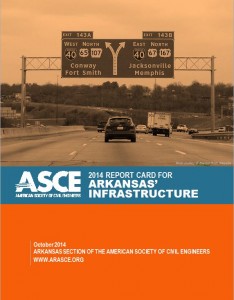 This Thursday, the Arkansas Section of the American Society of Civil Engineers released their inaugural Infrastructure Report Card for the state grading the states’ infrastructure.
Arkansas’ infrastructure received a cumulative GPA of “D+” in the 2014 Report Card for Arkansas’ Infrastructure. The seven infrastructure categories evaluated in the report include:
Roads (D+)
Drinking water (D+)
Transit (D+)
Levees (D)
Dams (D)
Bridges (C+)
Wastewater (C+)
The report noted that Arkansas has the 12th largest highway system in the nation, as well as the second highest traffic fatality rate in the country as of 2010. In addition, the state has 214 wastewater treatment facilities that will need upgrades and improvements in the next 20 years.
The Report Card, the first for Arkansas, was released during the annual ASCE Arkansas Section Conference and included a keynote address by Scott Bennett, director of the Arkansas State Highway and Transportation Department. The report was featured in both the Arkansas Democrat-Gazette and the Times-Record. The effort was led by Aaron Robinson, P.E., based in Jacksonville, Arkansas.
Read the full Arkansas Report Card
This Thursday, the Arkansas Section of the American Society of Civil Engineers released their inaugural Infrastructure Report Card for the state grading the states’ infrastructure.
Arkansas’ infrastructure received a cumulative GPA of “D+” in the 2014 Report Card for Arkansas’ Infrastructure. The seven infrastructure categories evaluated in the report include:
Roads (D+)
Drinking water (D+)
Transit (D+)
Levees (D)
Dams (D)
Bridges (C+)
Wastewater (C+)
The report noted that Arkansas has the 12th largest highway system in the nation, as well as the second highest traffic fatality rate in the country as of 2010. In addition, the state has 214 wastewater treatment facilities that will need upgrades and improvements in the next 20 years.
The Report Card, the first for Arkansas, was released during the annual ASCE Arkansas Section Conference and included a keynote address by Scott Bennett, director of the Arkansas State Highway and Transportation Department. The report was featured in both the Arkansas Democrat-Gazette and the Times-Record. The effort was led by Aaron Robinson, P.E., based in Jacksonville, Arkansas.
Read the full Arkansas Report Card
Tags: Arkansas, bridges, dams, infrastructure, levees, report, report card, roads, transit, wastewater, water
No Comments »
21-Year-Old Gas Tax Rate Still Holding Up America’s Roads & Bridges
October 1st, 2014 | By: Becky Moylan
The following is a statement from Randall (Randy) S. Over, P.E., F.ASCE, president of the American Society of Civil Engineers (ASCE), regarding the 21st anniversary of the last federal gas tax increase: “Today the federal gas tax’s 18.4-cent rate turns 21. While this is a rite of passage for American college students, this milestone is a sad reflection on Congressional inaction when it comes to our transportation system. According to the Consumer Price Index many household prices have nearly doubled in the past 21 years.- A loaf of bread cost: 1993: $0.75, 2014: $1.39.
- A pound of coffee: 1993: $2.50, 2014: $5.16.
Tags: bridges, gas tax, highway trust fund, roads, transit
No Comments »
New Report Card for Illinois' Infrastructure Shows Progress
April 2nd, 2014 | By: Infrastructure Report Card
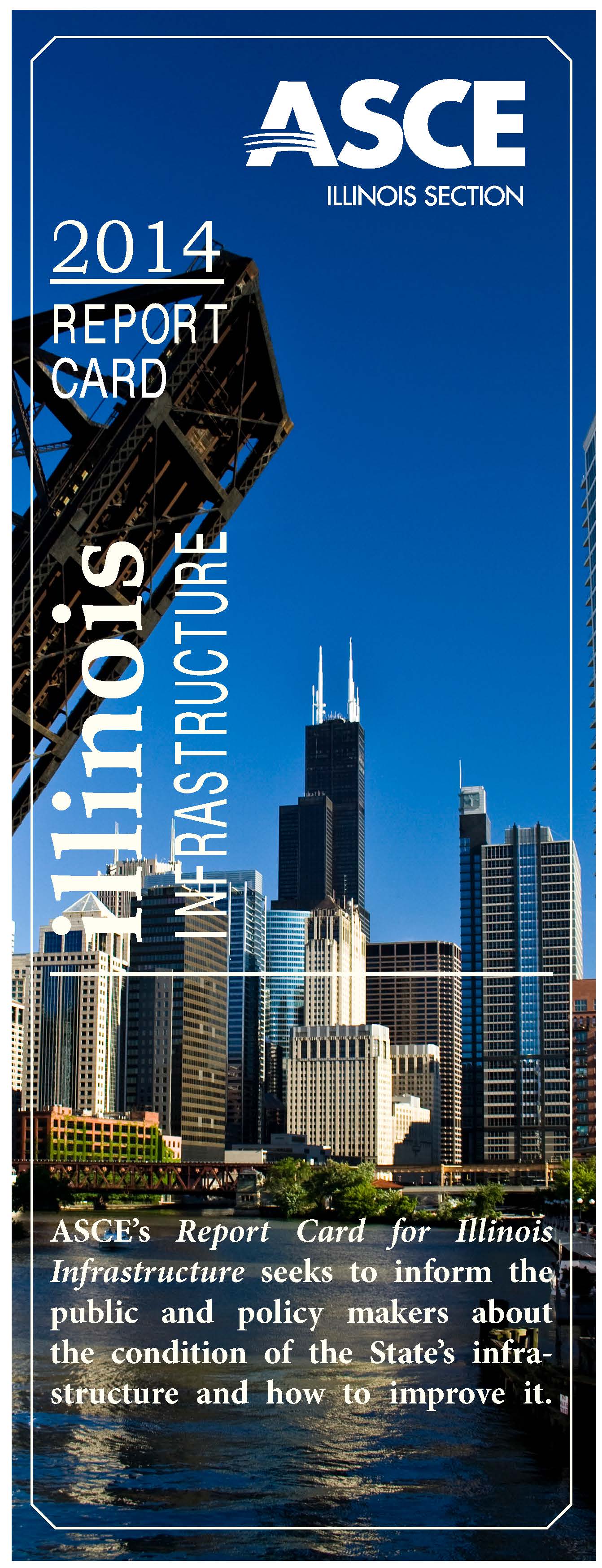 The 2014 Report Card for Illinois’ Infrastructure was released today by the Illinois Sections of the American Society of Civil Engineers (ASCE) at the Illinois Statehouse.
A panel of professional civil engineers throughout the state graded each infrastructure category according to the following eight criteria: capacity, condition, funding, future need, operation and maintenance, public safety, resilience, and innovation. In 2010, the infrastructure grade for Illinois was a D+, reflecting delayed maintenance and underinvestment across most categories. In the 2014 Report Card for Illinois’ Infrastructure, the state’s infrastructure G.P.A. jumped to a C- showing the progress made with leadership and solid infrastructure programs.
Over the past four years since the 2010 Report Card for Illinois’ Infrastructure, leaders at the state level and in Illinois’ cities—large and small—have started to make some steps to rebuild their aging infrastructure. Programs such as CREATE have started unclogging rail and traffic bottlenecks and the Illinois Jobs Now! effort by the state provided $31B to start fixing Illinois’ biggest infrastructure problems. These efforts have paid off and both the Rail and Drinking Water grades have gone up since the last Report Card. Plans like Chicago’s commitment to replace and repair aging water pipes shows how “thinking big” can create even bigger results.
But while some of the grades have gone up, Illinois’ infrastructure isn’t a B student yet. Aging infrastructure and delayed maintenance have taken their toll. Illinois’s average bridge is 40 years old which is close to retirement age for a bridge, Chicago has been replacing water pipes put in when Ulysses Grant was President, and more and more people and goods spend time stuck in traffic on Illinois’ roads and rails.
Let’s Raise the Grades
Illinois’s infrastructure touches almost every aspect of citizens’ daily life—from your neighborhood roads, to your phone, to the community school, to the new south suburban airport. In 2014, we need to be visionary but realistic about our infrastructure. We need to continue replace our oldest infrastructure but also begin to think of our infrastructure as an entire system in need of sustainable funding. We have to make collaborative and smart decisions, while assuring that safety remains our top priority.
We can continue to tackle Illinois’ infrastructure needs by asking our leaders to take on these 3 Key Solutions that would help and raise Illinois’s grades:
1. State and local governments should work together to create smart, efficient transportation systems that meet the changing needs of Illinois’s communities. We cannot just repair the investments of the past, but we need to build systems for a 21st century Illinois.
2. Create sustainable funding to maintain all new and planned investments in Illinois’s water systems. Simply replacing old pipes with limited or no plans for operation and maintenance will only lead to similar problems for future generations.
3. Invest in networks that will lessen the costs of doing business in Illinois, including inland waterways, rail, and airports. As the economy continues to expand, Illinois needs world-class infrastructure to compete with other states for new businesses and manufacturing.
Read the full 2014 Report Card for Illinois’ Infrastructure here.
The 2014 Report Card for Illinois’ Infrastructure was released today by the Illinois Sections of the American Society of Civil Engineers (ASCE) at the Illinois Statehouse.
A panel of professional civil engineers throughout the state graded each infrastructure category according to the following eight criteria: capacity, condition, funding, future need, operation and maintenance, public safety, resilience, and innovation. In 2010, the infrastructure grade for Illinois was a D+, reflecting delayed maintenance and underinvestment across most categories. In the 2014 Report Card for Illinois’ Infrastructure, the state’s infrastructure G.P.A. jumped to a C- showing the progress made with leadership and solid infrastructure programs.
Over the past four years since the 2010 Report Card for Illinois’ Infrastructure, leaders at the state level and in Illinois’ cities—large and small—have started to make some steps to rebuild their aging infrastructure. Programs such as CREATE have started unclogging rail and traffic bottlenecks and the Illinois Jobs Now! effort by the state provided $31B to start fixing Illinois’ biggest infrastructure problems. These efforts have paid off and both the Rail and Drinking Water grades have gone up since the last Report Card. Plans like Chicago’s commitment to replace and repair aging water pipes shows how “thinking big” can create even bigger results.
But while some of the grades have gone up, Illinois’ infrastructure isn’t a B student yet. Aging infrastructure and delayed maintenance have taken their toll. Illinois’s average bridge is 40 years old which is close to retirement age for a bridge, Chicago has been replacing water pipes put in when Ulysses Grant was President, and more and more people and goods spend time stuck in traffic on Illinois’ roads and rails.
Let’s Raise the Grades
Illinois’s infrastructure touches almost every aspect of citizens’ daily life—from your neighborhood roads, to your phone, to the community school, to the new south suburban airport. In 2014, we need to be visionary but realistic about our infrastructure. We need to continue replace our oldest infrastructure but also begin to think of our infrastructure as an entire system in need of sustainable funding. We have to make collaborative and smart decisions, while assuring that safety remains our top priority.
We can continue to tackle Illinois’ infrastructure needs by asking our leaders to take on these 3 Key Solutions that would help and raise Illinois’s grades:
1. State and local governments should work together to create smart, efficient transportation systems that meet the changing needs of Illinois’s communities. We cannot just repair the investments of the past, but we need to build systems for a 21st century Illinois.
2. Create sustainable funding to maintain all new and planned investments in Illinois’s water systems. Simply replacing old pipes with limited or no plans for operation and maintenance will only lead to similar problems for future generations.
3. Invest in networks that will lessen the costs of doing business in Illinois, including inland waterways, rail, and airports. As the economy continues to expand, Illinois needs world-class infrastructure to compete with other states for new businesses and manufacturing.
Read the full 2014 Report Card for Illinois’ Infrastructure here.
Tags: Illinois, infrastructure, report card, solutions, transit, transportation, vision, water
No Comments »
Georgia's C Infrastructure
January 13th, 2014 | By: Infrastructure Report Card
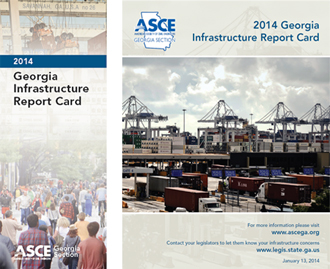 Georgia’s infrastructure has failed to improve over the last five years. In a new report, titled the 2014 Report Card for Georgia’s Infrastructure, the Georgia Section of the American Society of Civil Engineers (ASCE) awarded the state’s infrastructure a “C,” a grade unchanged from their 2009 Report Card. The lowest grade awarded was a “D-”, which went to the state’s dams and transit systems. The Report Card’s highest grade, a “B,” was given to Georgia’s energy and rail systems. Georgia’s growing population combined with cutbacks in infrastructure funding resulted in many of the low grades.
Specifically, the Report Card finds that Georgia is lagging in sustainable investment, including:
Georgia’s infrastructure has failed to improve over the last five years. In a new report, titled the 2014 Report Card for Georgia’s Infrastructure, the Georgia Section of the American Society of Civil Engineers (ASCE) awarded the state’s infrastructure a “C,” a grade unchanged from their 2009 Report Card. The lowest grade awarded was a “D-”, which went to the state’s dams and transit systems. The Report Card’s highest grade, a “B,” was given to Georgia’s energy and rail systems. Georgia’s growing population combined with cutbacks in infrastructure funding resulted in many of the low grades.
Specifically, the Report Card finds that Georgia is lagging in sustainable investment, including:
- Georgia ranks 49th in the nation in per capita transportation funding.
- Georgia is among the lowest in the country in transit spending per resident. According to the American Public Transportation Association’s 2010 Survey of State Funding for Public Transportation, Georgia spent just $0.63 per person in 2008. In comparison, New Jersey spent $119.52, Illinois spent $40.43, and North Carolina spent $7.94 per person in the same year.
- Georgia’s Safe Dams Program has faced over a 50% cut in staff since 2003, with each safety official now expected to oversee over 1,000 dams, or five times the national average.
- MARTA is the largest transit agency in the country to not receive state funding support for operations
- Georgia’s state motor fuel excise tax—which funds surface transportation projects—is one of the lowest in the United States
Tags: dams, grades, infrastructure, report card, state, transit, transportation, water
1 Comment »



 */ ?>
*/ ?>




